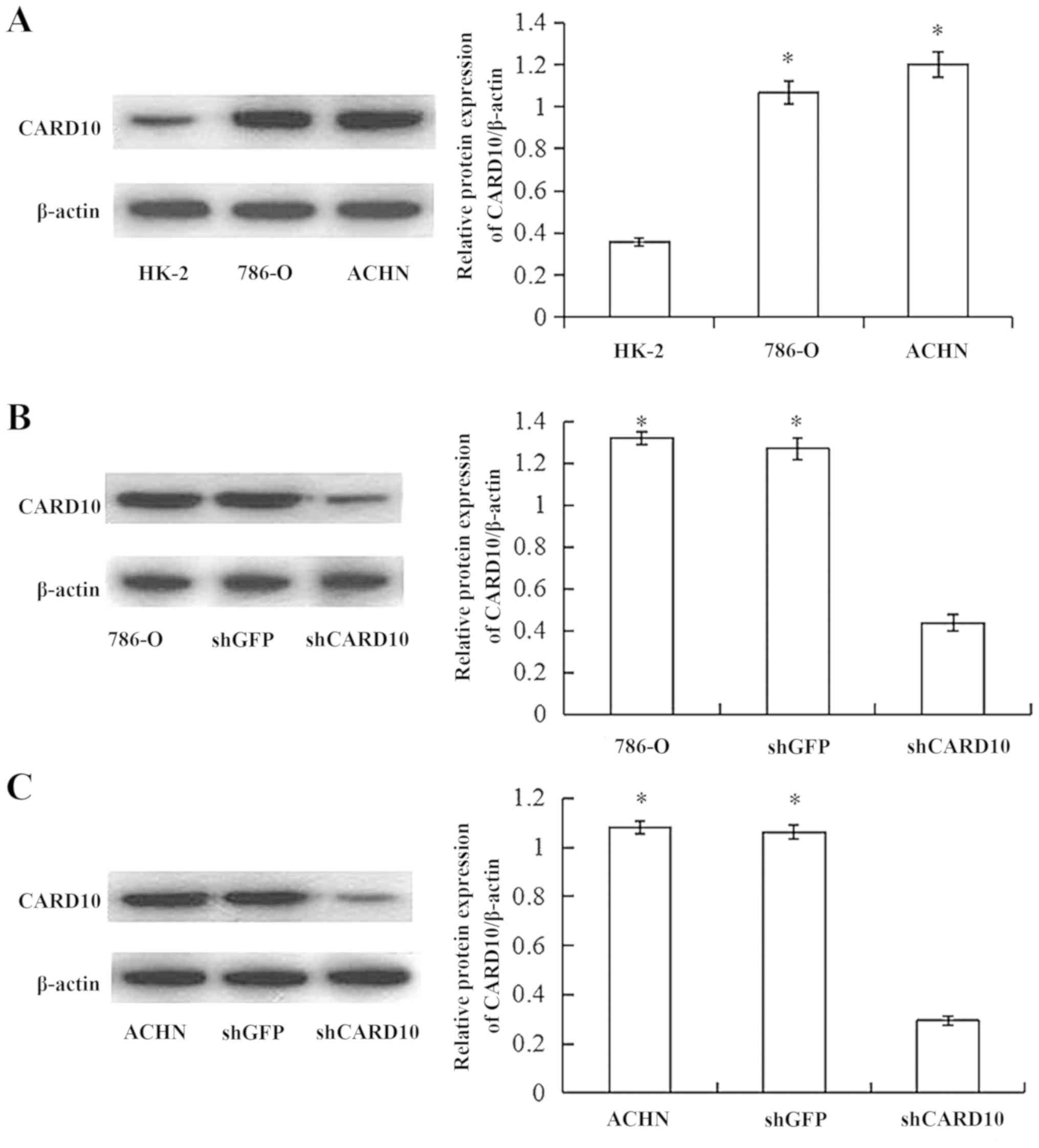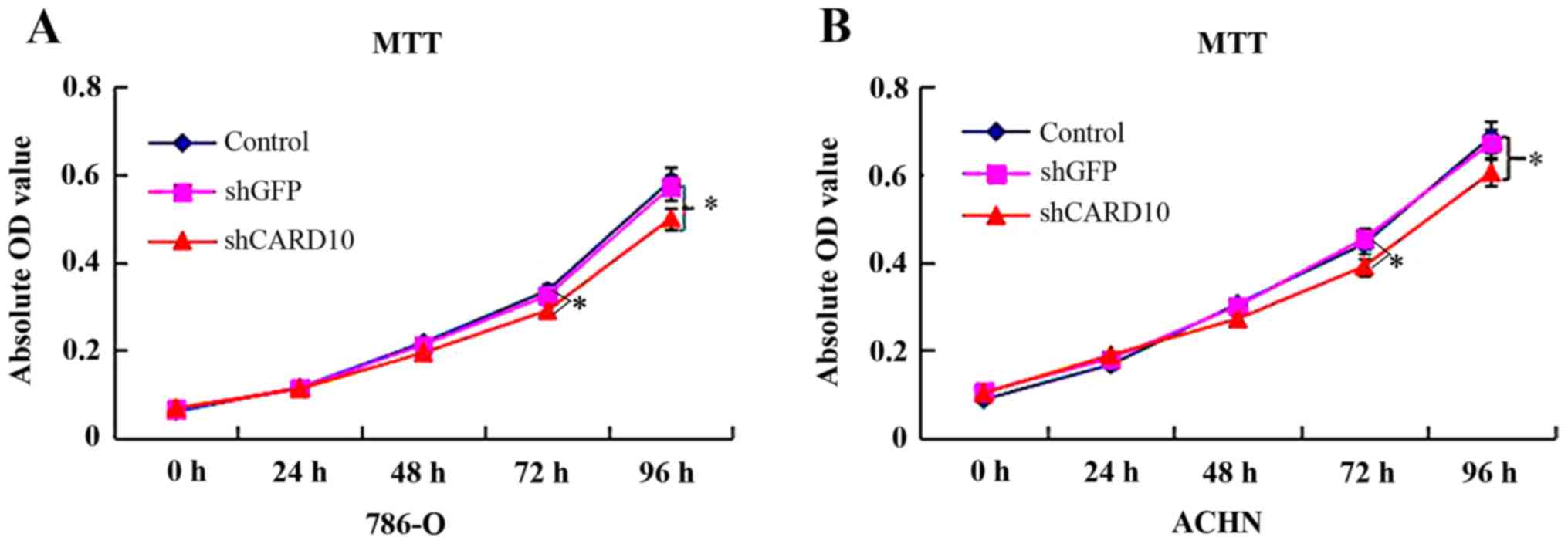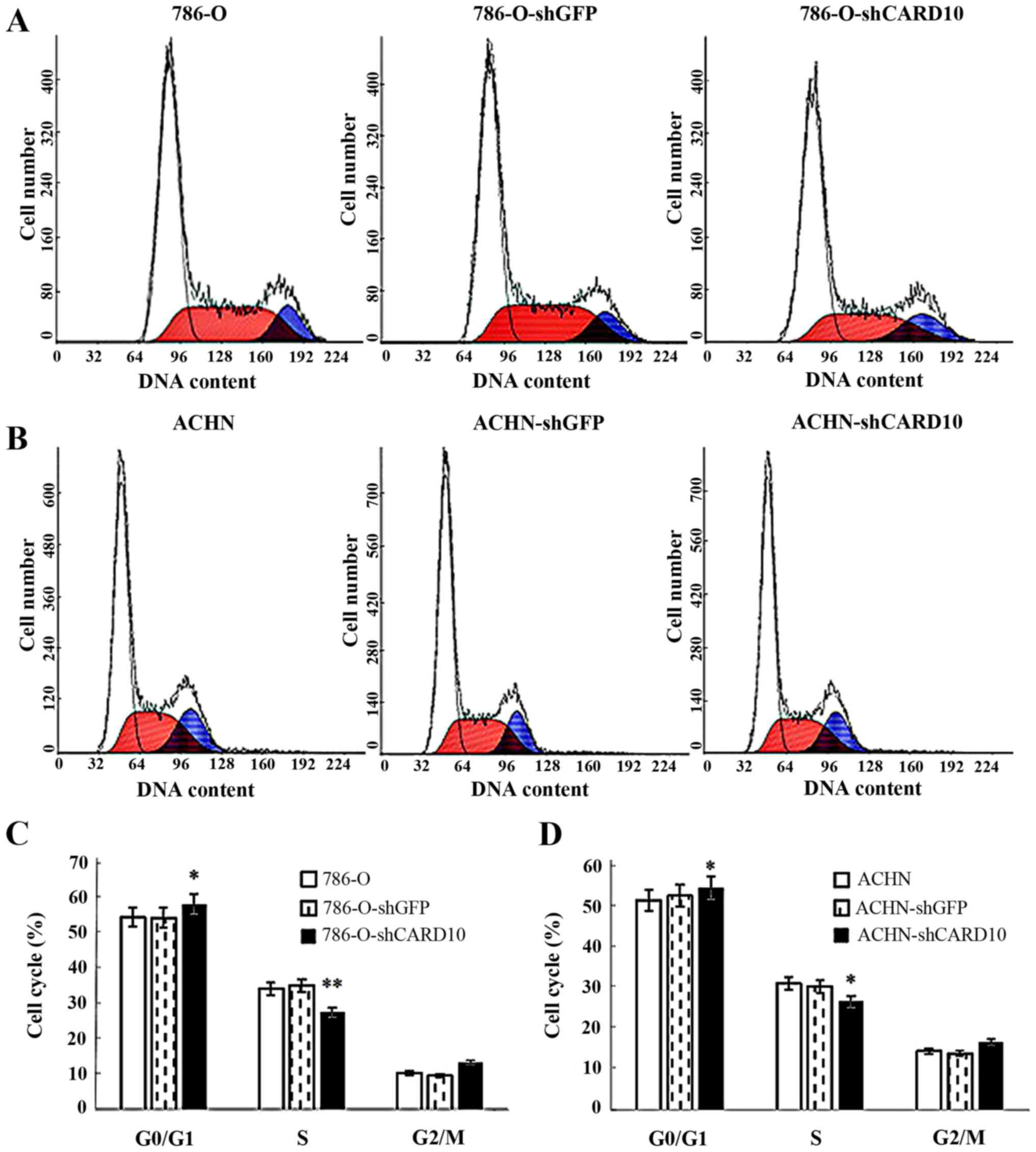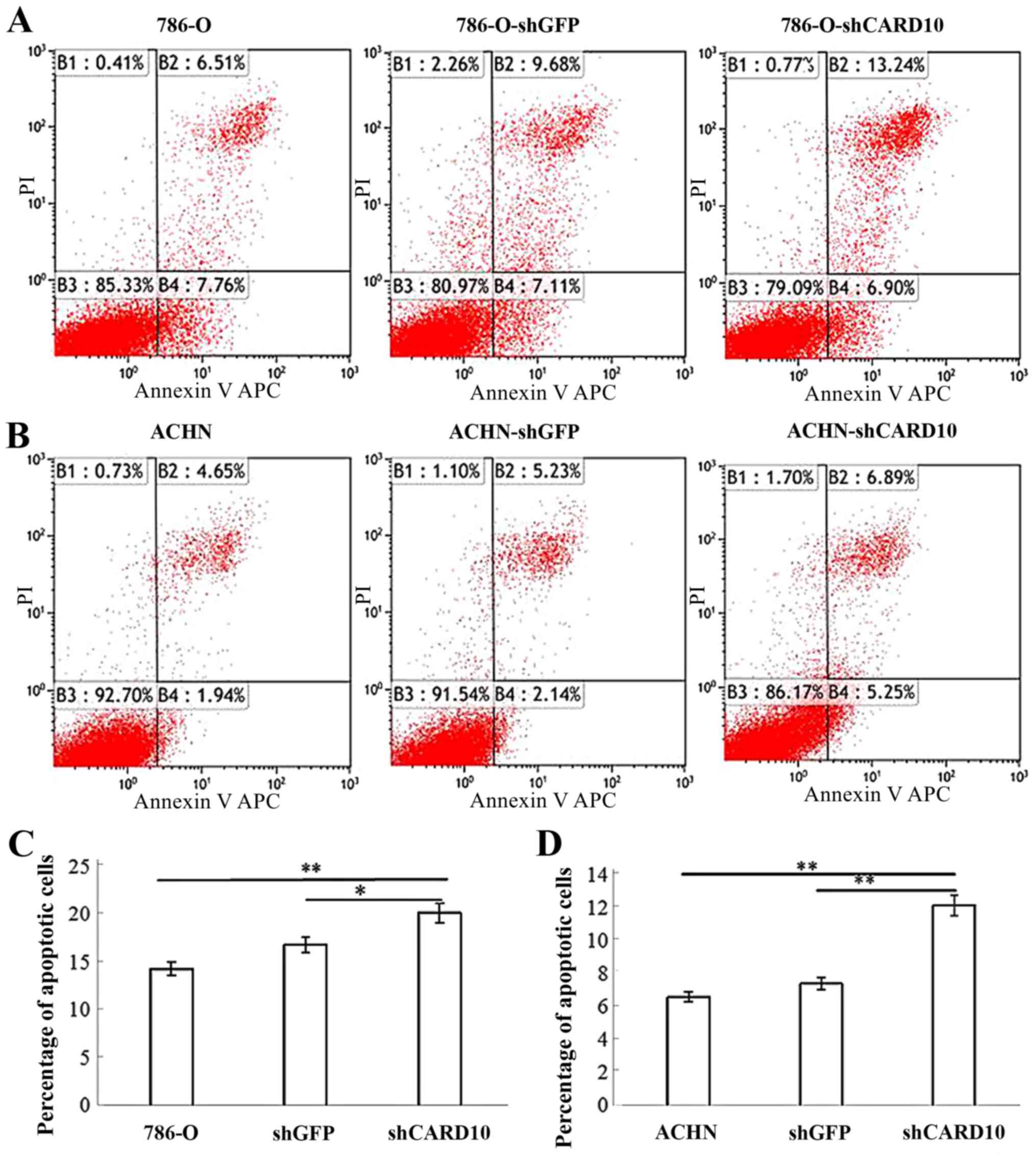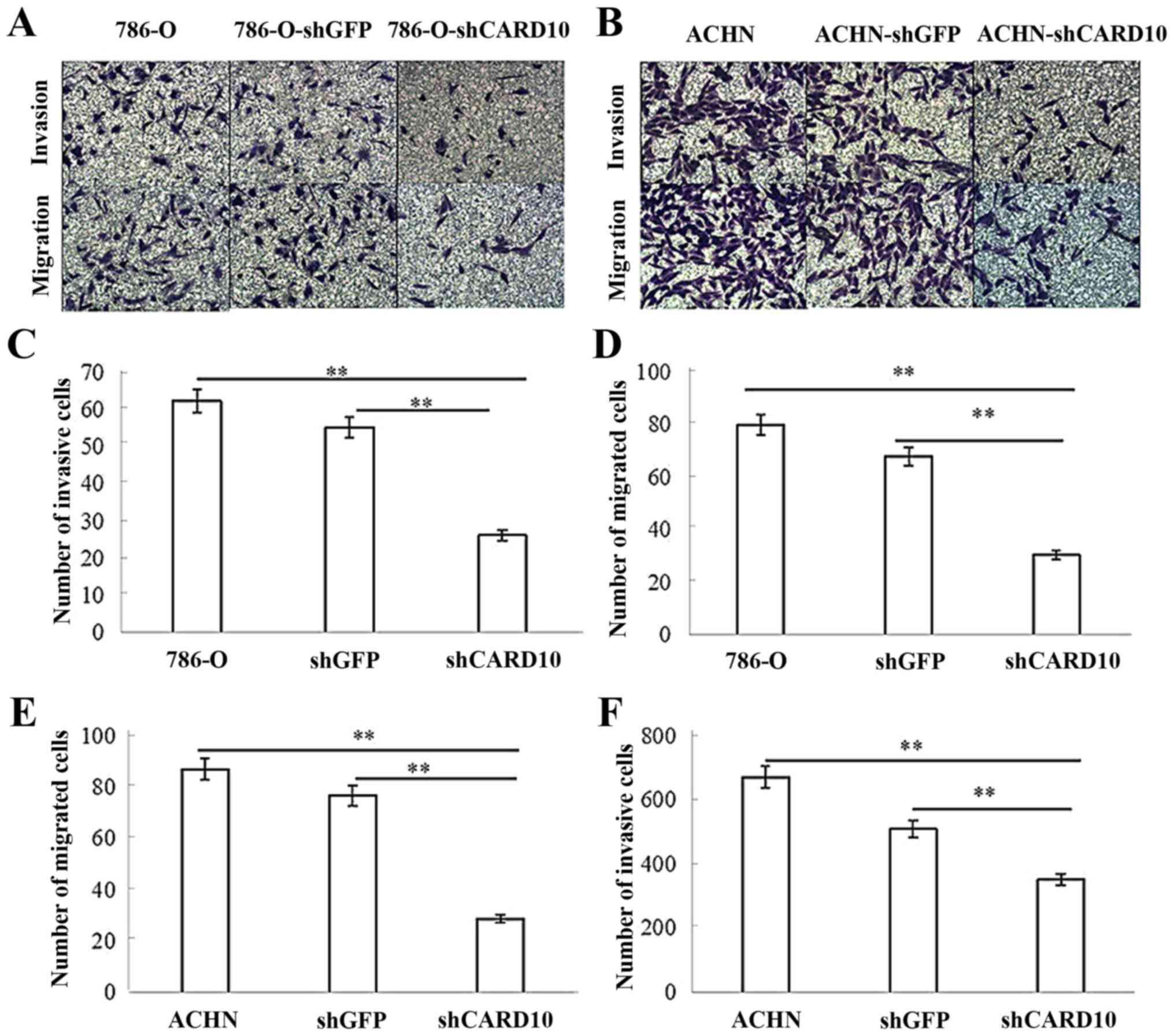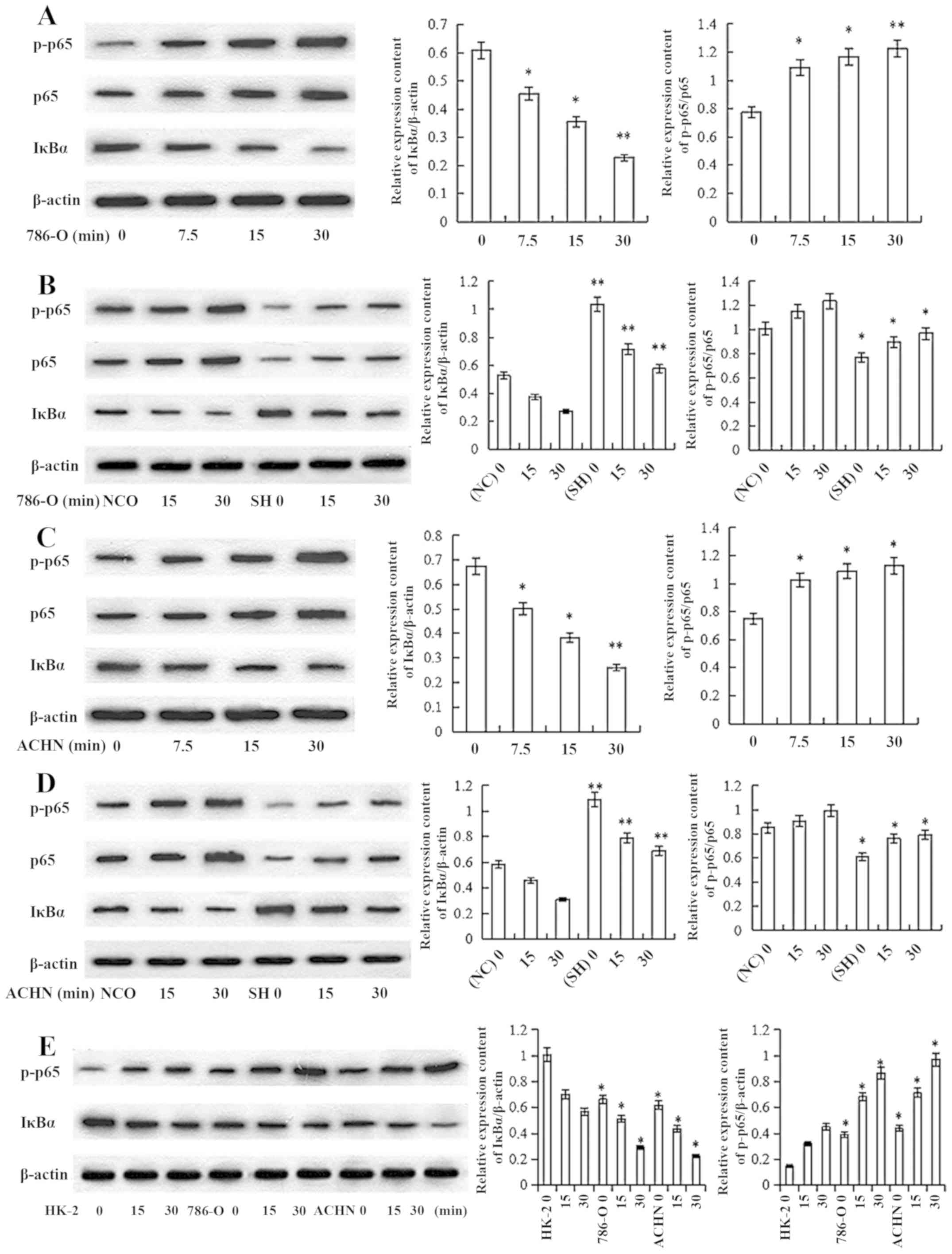|
1
|
Capitanio U and Montorsi F: Renal cancer.
Lancet. 387:894–906. 2016. View Article : Google Scholar : PubMed/NCBI
|
|
2
|
Kuusk T, Grivas N, de Bruijn R and Bex A:
The current management of renal cell carcinoma. Minerva Med.
108:357–369. 2017.PubMed/NCBI
|
|
3
|
Gupta K, Miller JD, Li JZ, Russell MW and
Charbonneau C: Epidemiologic and socioeconomic burden of metastatic
renal cell carcinoma (mRCC): A literature review. Cancer Treat Rev.
34:193–205. 2008. View Article : Google Scholar : PubMed/NCBI
|
|
4
|
Zotti T, Polvere I, Voccola S, Vito P and
Stilo R: CARD14/CARMA2 signaling and its role in inflammatory skin
disorders. Front Immunol. 9:21672018. View Article : Google Scholar : PubMed/NCBI
|
|
5
|
Scudiero I, Vito P and Stilo R: The three
CARMA sisters: So different, so similar: A portrait of the three
CARMA proteins and their involvement in human disorders. J Cell
Physiol. 229:990–997. 2014. View Article : Google Scholar : PubMed/NCBI
|
|
6
|
Stilo R, Liguoro D, Di Jeso B, Formisano
S, Consiglio E, Leonardi A and Vito P: Physical and functional
interaction of CARMA1 and CARMA3 with Ikappa kinase gamma-NFkappaB
essential modulator. J Biol Chem. 279:34323–34331. 2004. View Article : Google Scholar : PubMed/NCBI
|
|
7
|
Blonska M and Lin X: NF-κB signaling
pathways regulated by CARMA family of scaffold proteins. Cell Res.
21:55–70. 2011. View Article : Google Scholar : PubMed/NCBI
|
|
8
|
Jiang C and Lin X: Regulation of NF-κB by
the CARD proteins. Immunol Rev. 246:141–153. 2012. View Article : Google Scholar : PubMed/NCBI
|
|
9
|
Juilland M and Thome M: Holding all the
CARDs: How MALT1 controls CARMA/CARD-dependent signaling. Front
Immunol. 9:19272018. View Article : Google Scholar : PubMed/NCBI
|
|
10
|
Wang L, Qian L, Li X and Yan J:
MicroRNA-195 inhibits colorectal cancer cell proliferation,
colony-formation and invasion through targeting CARMA3. Mol Med
Rep. 10:473–478. 2014. View Article : Google Scholar : PubMed/NCBI
|
|
11
|
Chang YW, Chiu CF, Lee KY, Hong CC, Wang
YY, Cheng CC, Jan YH, Huang MS, Hsiao M, Ma JT and Su JL: CARMA3
represses metastasis suppressor NME2 to promote lung cancer
stemness and metastasis. Am J Respir Crit Care Med. 192:64–75.
2015. View Article : Google Scholar : PubMed/NCBI
|
|
12
|
Du S, Jia L, Zhang Y, Fang L, Zhang X and
Fan Y: CARMA3 is upregulated in human pancreatic carcinoma, and its
depletion inhibits tumor proliferation, migration, and invasion.
Tumour Biol. 35:5965–5970. 2014. View Article : Google Scholar : PubMed/NCBI
|
|
13
|
Ekambaram P, Lee JL, Hubel NE, Hu D,
Yerneni S, Campbell PG, Pollock N, Klei LR, Concel VJ, Delekta PC,
et al: The CARMA3-Bcl10-MALT1 signalosome drives NFκB activation
and promotes aggressiveness in angiotensin II receptor-positive
breast cancer. Cancer Res. 78:1225–1240. 2018. View Article : Google Scholar : PubMed/NCBI
|
|
14
|
Xie C, Han Y, Fu L, Li Q, Qiu X and Wang
E: Overexpression of CARMA3 is associated with advanced tumor
stage, cell cycle progression, and cisplatin resistance in human
epithelial ovarian cancer. Tumour Biol. 35:7957–7964. 2014.
View Article : Google Scholar : PubMed/NCBI
|
|
15
|
Wu GL, Yuan JL, Huang XD, Rong JF, Zhang
LX, Liu YP and Wang FL: Evaluating the expression of CARMA3 as a
prognostic tumor marker in renal cell carcinoma. Tumour Biol.
34:3431–3435. 2013. View Article : Google Scholar : PubMed/NCBI
|
|
16
|
Zhang X, Liu X, Jing Z, Bi J, Li Z, Liu X,
Li J, Li Z, Zhang Z and Kong C: The circINTS4/miR-146b/CARMA3 axis
promotes tumorigenesis in bladder cancer. Cancer Gene Ther.
2019.(Epub ahead of print). View Article : Google Scholar
|
|
17
|
Man X, He J, Kong C, Zhu Y and Zhang Z:
Clinical significance and biological roles of CARMA3 in human
bladder carcinoma. Tumour Biol. 35:4131–4136. 2014. View Article : Google Scholar : PubMed/NCBI
|
|
18
|
Mahanivong C, Chen HM, Yee SW, Pan ZK,
Dong Z and Huang S: Protein kinase C alpha-CARMA3 signaling axis
links Ras to NF-kappa B for lysophosphatidic acid-induced urokinase
plasminogen activator expression in ovarian cancer cells. Oncogene.
27:1273–1280. 2008. View Article : Google Scholar : PubMed/NCBI
|
|
19
|
Wang D, You Y, Lin PC, Xue L, Morris SW,
Zeng H, Wen R and Lin X: Bcl10 plays a critical role in NF-kappaB
activation induced by G protein-coupled receptors. Proc Natl Acad
Sci USA. 104:145–150. 2007. View Article : Google Scholar : PubMed/NCBI
|
|
20
|
Zhang S, Zhang C, Liu W, Zheng W, Zhang Y,
Wang S, Huang D, Liu X and Bai Z: MicroRNA-24 upregulation inhibits
proliferation, metastasis and induces apoptosis in bladder cancer
cells by targeting CARMA3. Int J Oncol. 47:1351–1360. 2015.
View Article : Google Scholar : PubMed/NCBI
|
|
21
|
Senftleben U, Cao Y, Xiao G, Greten FR,
Krähn G, Bonizzi G, Chen Y, Hu Y, Fong A, Sun SC and Karin M:
Activation by IKKalpha of a second, evolutionary conserved,
NF-kappa B signaling pathway. Science. 293:1495–1499. 2001.
View Article : Google Scholar : PubMed/NCBI
|
|
22
|
Zhang S and Lin X: CARMA3: Scaffold
protein involved in NF-κB signaling. Front Immunol. 10:1762019.
View Article : Google Scholar : PubMed/NCBI
|
|
23
|
Mitchell S, Vargas J and Hoffmann A:
Signaling via the NFκB system. Wiley Interdiscip Rev Syst Biol Med.
8:227–241. 2016. View Article : Google Scholar : PubMed/NCBI
|
|
24
|
Dolcet X, Llobet D, Pallares J and
Matias-Guiu X: NF-kB in development and progression of human
cancer. Virchows Arch. 446:475–482. 2005. View Article : Google Scholar : PubMed/NCBI
|
|
25
|
Cildir G, Low KC and Tergaonkar V:
Noncanonical NF-κB signaling in health and disease. Trends Mol Med.
22:414–429. 2016. View Article : Google Scholar : PubMed/NCBI
|
|
26
|
DiDonato JA, Mercurio F and Karin M: NF-κB
and the link between inflammation and cancer. Immunol Rev.
246:379–400. 2012. View Article : Google Scholar : PubMed/NCBI
|
|
27
|
Xia Y, Shen S and Verma IM: NF-κB, an
active player in human cancers. Cancer Immunol Res. 2:823–830.
2014. View Article : Google Scholar : PubMed/NCBI
|
|
28
|
McAuley JR, Freeman TJ, Ekambaram P, Lucas
PC and McAllister-Lucas LM: CARMA3 is a critical mediator of G
protein-coupled receptor and receptor tyrosine kinase-driven solid
tumor pathogenesis. Front Immunol. 9:18872018. View Article : Google Scholar : PubMed/NCBI
|
|
29
|
Jiang C and Lin X: Analysis of epidermal
growth factor-induced NF-κB signaling. Methods Mol Biol.
1280:75–102. 2015. View Article : Google Scholar : PubMed/NCBI
|
|
30
|
Pan D and Lin X: Epithelial growth factor
receptor-activated nuclear factor κB signaling and its role in
epithelial growth factor receptor-associated tumors. Cancer J.
19:461–467. 2013. View Article : Google Scholar : PubMed/NCBI
|
|
31
|
Pan D, Zhu Y, Zhou Z, Wang T, You H, Jiang
C and Lin X: The CBM complex underwrites NF-κB activation to
promote HER2-associated tumor malignancy. Mol Cancer Res.
14:93–102. 2016. View Article : Google Scholar : PubMed/NCBI
|
|
32
|
Jiang C, Zhou Z, Quan Y, Zhang S, Wang T,
Zhao X, Morrison C, Heise MT, He W, Miller MS and Lin X: CARMA3 is
a host factor regulating the balance of inflammatory and antiviral
responses against viral infection. Cell Rep. 14:2389–2401. 2016.
View Article : Google Scholar : PubMed/NCBI
|
|
33
|
Chen R, Jin G and McIntyre TM: The soluble
protease ADAMDEC1 released from activated platelets hydrolyzes
platelet membrane pro-epidermal growth factor (EGF) to active
high-molecular-weight EGF. J Biol Chem. 292:10112–10122. 2017.
View Article : Google Scholar : PubMed/NCBI
|
|
34
|
Elbaz M, Nasser MW, Ravi J, Wani NA,
Ahirwar DK, Zhao H, Oghumu S, Satoskar AR, Shilo K, Carson WE III
and Ganju RK: Modulation of the tumor microenvironment and
inhibition of EGF/EGFR pathway: Novel anti-tumor mechanisms of
Cannabidiol in breast cancer. Mol Oncol. 9:906–919. 2015.
View Article : Google Scholar : PubMed/NCBI
|
|
35
|
Li Y, Lin Z, Chen B, Chen S, Jiang Z, Zhou
T, Hou Z and Wang Y: Ezrin/NF-kB activation regulates
epithelial-mesenchymal transition induced by EGF and promotes
metastasis of colorectal cancer. Biomed Pharmacother. 92:140–148.
2017. View Article : Google Scholar : PubMed/NCBI
|
|
36
|
Wu W, Jaspers I, Zhang W, Graves LM and
Samet JM: Role of Ras in metal-induced EGF receptor signaling and
NF-kappaB activation in human airway epithelial cells. Am J Physiol
Lung Cell Mol Physiol. 282:L1040–L1048. 2002. View Article : Google Scholar : PubMed/NCBI
|
|
37
|
Liptay S, Weber CK, Ludwig L, Wagner M,
Adler G and Schmid RM: Mitogenic and antiapoptotic role of
constitutive NF-kappaB/Rel activity in pancreatic cancer. Int J
Cancer. 105:735–746. 2003. View Article : Google Scholar : PubMed/NCBI
|
|
38
|
Jiang T, Grabiner B, Zhu Y, Jiang C, Li H,
You Y, Lang J, Hung MC and Lin X: CARMA3 is crucial for
EGFR-Induced activation of NF-κB and tumor progression. Cancer Res.
71:2183–2192. 2011. View Article : Google Scholar : PubMed/NCBI
|















